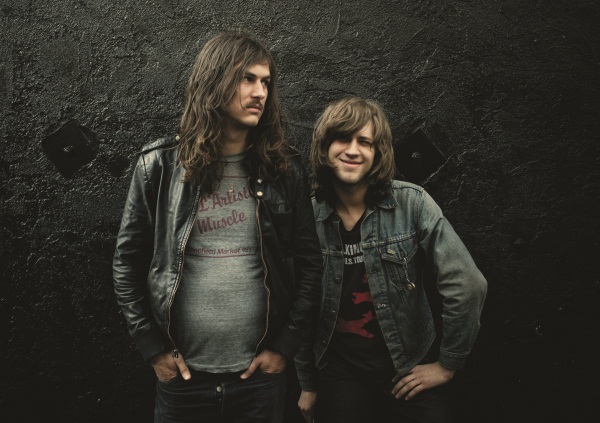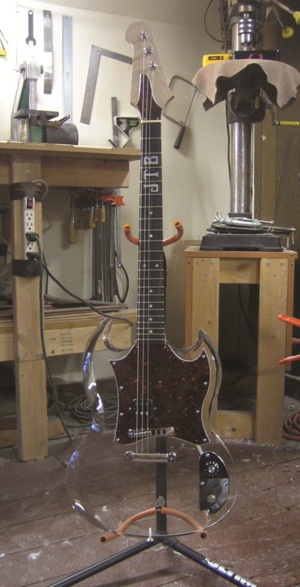Videos by American Songwriter
What’s Jake Orrall’s gear fantasy? The guitarist for JEFF the Brotherhood says it involves amps. Lots of amps.
“If I had my way, I’d have a huge wall of sound, but we don’t have enough space in the van right now,” he says.
Yes, for now, Orrall and his brother, Jamin, will have to settle for being the Nashville garage rock duo that everyone, from London to New York City, wants to see. The offspring of country songwriter Robert Ellis Orrall, the two brothers have received growing critical praise after each of their six albums, the most recent of which, 2011’s We Are The Champions, could easily be the soundtrack to the most epic moment of your life, if the most epic moment of your life involved a roller derby in outer space.
And for a rockin’ space age sound, you need a rockin’ space age guitar. Jake Orrall plays a custom 3-string model with a see-through Lucite SG body and a Firebird peghead, which was built for him by Dave Johnson of Scale Model Guitars.
What’s the deal with using only three strings? Well, that’s actually pretty futuristic, considering Orrall used to play with two. “I started on 2-string guitar, because I didn’t really know how to play. I figured if I started with two strings, it would be easy to learn,” he says.
The guitar, which also has a custom-built 3-position humbucker and the initials “JTB” on the neck, took Johnson between 40 to 50 hours to make.
“Everything I do is cut from scratch. When I started, it was a chunk of acrylic and a chunk of maple,” Johnson says.
In this case, he shaped Orrall’s guitar’s body out of a giant sheet of Lucite that was left over from making a giant aquarium elsewhere. The hardest part of the process? Making the insides of the transparent instrument look tidy.
“I didn’t want to see any guts. I just wanted to see straight through it,” Johnson says.
Orrall uses two amps for his signature moon-man-meets-cave-man sound. His main amp is a 1972 Sunn Concert Lead, and his bass amp, which powers his two low-end speakers, is an Acoustic B600.
“I’ve spent the last ten years just trying to find amps that work for me. When we started the band, I had a Peavey 115 Combo amp, which is a keyboard amp. I eventually figured out what I was doing.”
As for pedals, Orrall keeps it simple. He gets his distortion from a Big Muff.
So do people sometimes spend way too much time overthinking their gear? Orrall says that depends on what you’re trying to do with the band you’re in, as there are “more gear-based bands and there are more song-based bands.”
When asked which type of band JEFF the Brotherhood is, the guitarist demurs. But it’s clear when talking about how aspiring musicians should approach their gear that Orrall believes his three strings and one distortion pedal mindset is part of the reason for his band’s success.
“Work with what you’ve got until you can’t stand it anymore and then get something better,” he says. “It’s good having limitations. Having limitations, having shitty gear, will force you to be creative.”









Leave a Reply
Only members can comment. Become a member. Already a member? Log in.